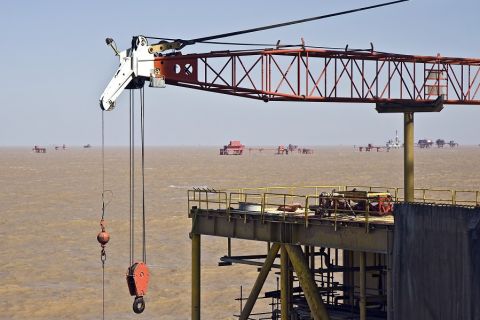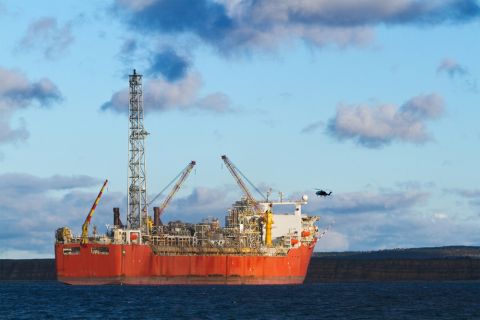
A NAPE panel emphasized the importance of the G (governance) during the ESG session of the recent business conference. (Source: Hart Energy)
HOUSTON—A panel examining how oil and gas companies should address ESG goals zeroed in on the governance component at the recent NAPE Business Conference.
Their assertion: the collection of massive volumes of tangible ESG data is nowhere near as important as the ability to use it to a company’s advantage. Indeed, failing to fix an approach to management could put an oil and gas company’s survival at risk.
“I think a lot of folks have been measuring a lot of stuff and collecting a lot of data, but they’ve actually not been using that data to really manage their business,” said David de Roode, executive vice president and Lockton partner with Lockton Cos., the world’s largest privately held insurance brokerage firm. It’s a matter of accountability and responsibility, he said, adding that he considers the problem to be prevalent across all industry verticals.
The industry has struggled with the demands of the EPA’s Subpart W, the greenhouse-gas reporting program’s section for oil and gas systems, said Barbara Baumann, president of the oil and gas consultancy Cross Creek Energy Corp. Companies had been measuring data on emission averages over time, which is of limited use. But that, Baumann said, is changing fast, with progress coming in leaps and bound for real-time data flowing from the oil field.
“We’ve got to have governance that uses that kind of data to rank environmental projects and opportunities,” she said. “We’ve got to hold management and directors accountable through performance reviews in compensation, because as good as the data is getting, we’ve got to be able to do that.”
Some won’t survive
De Roode illustrated his concerns with an anecdote about an executive with a publicly traded oilfield services company who shared an internal key performance indicators (KPI) report.
“The one thing that was missing from their KPI report is they didn’t have any goals identified,” he said. “So, they’re just collecting data and, when I take that data and I compare it to their peers—I’ve got a lot of comparative peer data—they’re mediocre. They don’t know that and they’ve also not set any goals for themselves, so they’re not managing to that.”
But it goes beyond the ability to interpret and act on a particular set of data. At stake is a fundamental tenet of a market economy: not everybody wins.
“Just because you have a business doesn’t mean you’re going to be successful,” de Roode stressed. “It’s hard work, you rely on a lot of people, rely on a lot of luck, timing and hopefully some strategy.”
Some will learn these lessons naturally, others learn when they are forced to and then there are those who, well ….
“I think that, this year, we could possibly see some of the falloff of those folks that didn’t get on the bandwagon … or not,” he conceded. “Current commodity prices hide a lot of sins, particularly when you’ve got supply issues. I think those companies that ignore the hype, remain disciplined, realize there’s always opportunity for continuous improvement … will do well.”
Growth versus value
To be fair, it’s also been a challenge for executives to set a course when investors have their own agendas.
“Our industry has been ‘capital destroyers’ for over a decade,” Baumann said. “We didn’t set out to do that. Our investors were pleading for growth. We have been an industry that has outspent our cash flow year after year after year.”
Directors and management responded to signals from shareholders and were rewarded by stock performance, she said. It didn’t matter if management outspent cash flow by 5% or 30%—the stock price rose in either case. Then shareholders seemingly changed their minds en masse in 2017, demanding value over growth. That’s not a good excuse to abandon leadership accountability and responsibility.
“Directors are supposed to be managing risk, not just optimizing shareholder return, and a wholesome risk assessment by any of those companies would have uncovered the precarious nature of their investment-grade ratings, their debt coverage,” Baumann said. “They would have appropriately managed, stress-tested their balance sheet against enormous downdraft in prices.”
Hitching your wagon to the star of shareholder returns can result in sub-optimizing your risk profile, she said.
Which reinforces why the G is more important than the E and S, in the view of the panelists.
“I think the ESG concept is a great one if we leverage it the right way and really take advantage of what it can do,” de Roode said. “But I think there’s so much focus on the E, when the focus really needs starts with the governance. And then that just filters down into all these other areas.”
Recommended Reading
Oceaneering Won $200MM in Manufactured Products Contracts in Q4 2023
2024-02-05 - The revenues from Oceaneering International’s manufactured products contracts range in value from less than $10 million to greater than $100 million.
E&P Highlights: Feb. 5, 2024
2024-02-05 - Here’s a roundup of the latest E&P headlines, including an update on Enauta’s Atlanta Phase 1 project.
CNOOC’s Suizhong 36-1/Luda 5-2 Starts Production Offshore China
2024-02-05 - CNOOC plans 118 development wells in the shallow water project in the Bohai Sea — the largest secondary development and adjustment project offshore China.
TotalEnergies Starts Production at Akpo West Offshore Nigeria
2024-02-07 - Subsea tieback expected to add 14,000 bbl/d of condensate by mid-year, and up to 4 MMcm/d of gas by 2028.
US Drillers Add Oil, Gas Rigs for Third Time in Four Weeks
2024-02-09 - Despite this week's rig increase, Baker Hughes said the total count was still down 138 rigs, or 18%, below this time last year.





